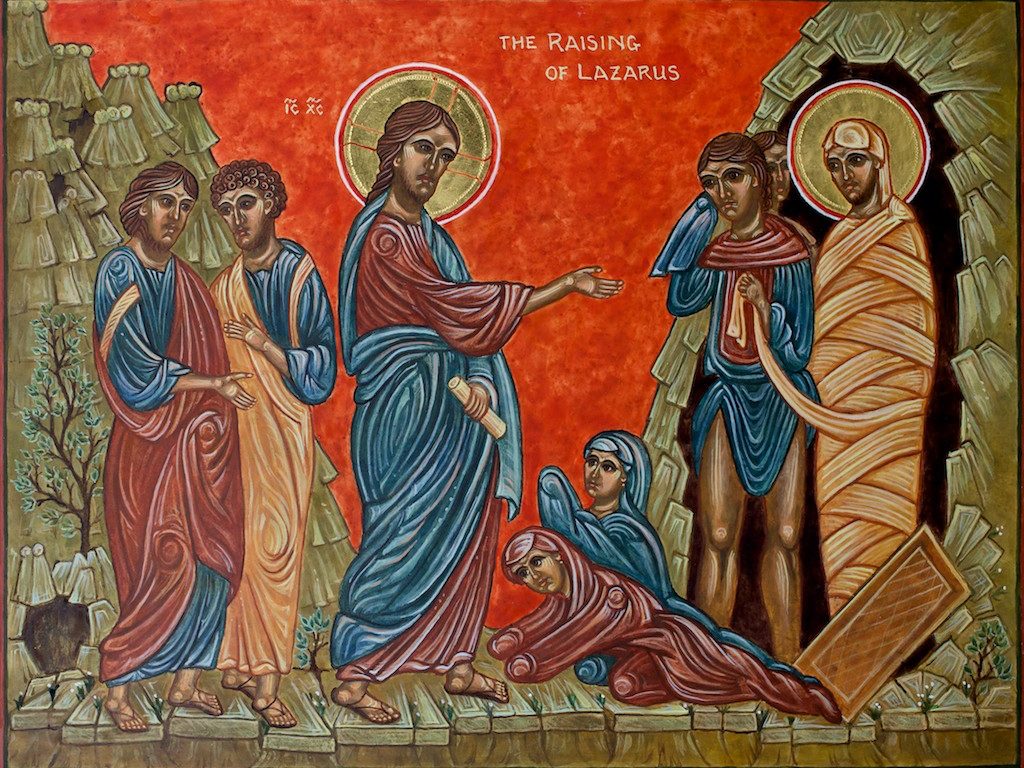
I received a message from an old friend who justifiably is worried about the direction of Holy Week and our need as priests to serve the people of God in more ways rather than fewer. I share my response with you all in the hopes that it brings the comfort that writing it has to me.
Dear XXXXXXXXX,
I am sorry for the shutdown order in your state, yet glad of it at the same time. I heartily agree that this feels quite strange after so many decades of trying to do more for more people. We all are used to doing our highest and best, particularly during Holy Week and Easter. Not having these services, devotions and litanies feels like something has been ripped away.
Yet, I am reminded as I say prayers in the chapel that ours is not a God confined in time and space let alone the walls of a church building. To be sure, we are a people that lives in communio, and the liturgical and Sacramental aspects of who we are center on this.
However, does not Christ work so many miracles “at a distance”. I was struck in my lectio today by several poignant lessons, the first being the healing of the centurion’s servant. (Mt. 8:5-13; Lk. 7:1-10). We believe that we are so familiar with the account, here from Saint Luke’s Gospel:
Now when he had ended all his sayings in the audience of the people, he entered into Capernaum. And a certain centurion’s servant, who was dear unto him, was sick, and ready to die. And when he heard of Jesus, he sent unto him the elders of the Jews, beseeching him that he would come and heal his servant. And when they came to Jesus, they besought him instantly, saying, That he was worthy for whom he should do this: for he loveth our nation, and he hath built us a synagogue. Then Jesus went with them. And when he was now not far from the house, the centurion sent friends to him, saying unto him, Lord, trouble not thyself: for I am not worthy that thou shouldest enter under my roof: wherefore neither thought I myself worthy to come unto thee: but say in a word, and my servant shall be healed. …When Jesus heard these things, he marvelled at him, and turned him about, and said unto the people that followed him, I say unto you, I have not found so great faith, no, not in Israel. And they that were sent, returning to the house, found the servant whole that had been sick.
How often in the Mass do we repeat the centurion’s plea, “Speak the word only, and my soul shall be healed”? I wonder how often we stop to think about the passage. Christ, acting out of a love that transcends nation and responds to faith, heals at a distance. Unlike other miracles, there is no physical contact or, apparently, even visual proximity to the servant. Can he not do all then at “social distance” or when Christians must stay at home?
I then turned to Jesus’ healing a demon-possessed girl recorded in St. Matthew 15:21-28, and St. Mark 7:24-30. From St. Matthew, there are remarkable similarities in the events that we think are so very familiar:
Then Jesus went thence, and departed into the coasts of Tyre and Sidon. And, behold, a woman of Canaan came out of the same coasts, and cried unto him, saying, Have mercy on me, O Lord, thou son of David; my daughter is grievously vexed with a devil. But he answered her not a word. And his disciples came and besought him, saying, Send her away; for she crieth after us. But he answered and said, I am not sent but unto the lost sheep of the house of Israel. Then came she and worshipped him, saying, Lord, help me. But he answered and said, It is not meet to take the children’s bread, and to cast it to dogs. And she said, Truth, Lord: yet the dogs eat of the crumbs which fall from their masters’ table. Then Jesus answered and said unto her, O woman, great is thy faith: be it unto thee even as thou wilt. And her daughter was made whole from that very hour.
Once again, there is a prayer with which we may tend to say without thinking. It is the prayer of the Pilgrim, “Lord Jesus Christ, Son of God, have mercy on me a sinner,” as we zip through the knots on our prayer ropes. Yet in this passage, Christ’s love transcends nation, responds to the deep faith of the mother, and reaches out through time and space to cleanse the woman’s daughter.
Even in the raising of St. Lazarus, passages that should be so important to our Holy Week meditations, the same elements of love and faith form a resurrection miracle in St. John 11:38-53.
Jesus saith unto her, Said I not unto thee, that, if thou wouldest believe, thou shouldest see the glory of God? Then they took away the stone from the place where the dead was laid. And Jesus lifted up his eyes, and said, Father, I thank thee that thou hast heard me. And I knew that thou hearest me always: but because of the people which stand by I said it, that they may believe that thou hast sent me. And when he thus had spoken, he cried with a loud voice, Lazarus, come forth. And he that was dead came forth…
Again, here is a passage that we so often take for granted. Jesus does not need to enter the tomb. He does not need to touch Lazarus. He prays in response to faith, then “speaks the word only” and there is resurrection.
In my case, these has worked a miracle in Holy Week as I have pondered how to do more for the people I serve. For nearly twenty years, I have had Good Friday meditations centering on Christ’s Last Words from the Cross. With these accounts in mind, “Forgive them Father for they know not what they do” (Lk. 23:34) stuck me in a most profound way.
From the gibbet of the Cross, this plea on mankind’s behalf ignores nation, it ignores distance and barrier, and, indeed, transcends time. It is the healing miracle: the gift of forgiveness that passes understanding given to an unknowing people.
I pray that these thoughts prove as comforting to you as they have to me as we ponder a Holy Week without the “trimmings” we may have come to take for granted-the services, the litanies, the processions, the music, and, most of all, the community of the faithful. May these circumstances, dreadful as they are, bring a new appreciation for all that we have especially outside of the walls of our churches. Let us pray that they help all value life as dearly as Christ does.
Please pray for me as I pray for you.
Blessings of Holy Week,
Fr. C.
